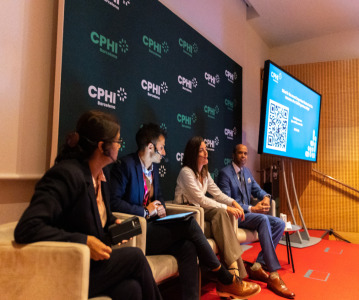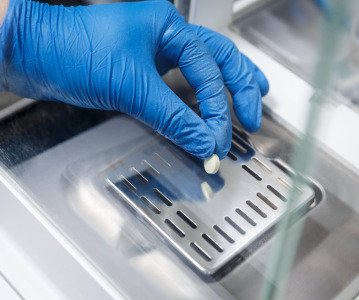NIH Suspends Operations in its Clinical Center Pharmaceutical Development Section

The National Institutes of Health (NIH) Clinical Center has suspended operations of its Pharmaceutical Development Section (PDS) due to the discovery of serious manufacturing problems and lack of compliance with standard operating procedures. Upon receipt of a complaint, FDA representatives inspected the PDS between 19 May and 29 May, and found a series of deficiencies that will require the NIH Clinical Center to take a number of corrective actions.
The facility makes products for certain clinical research studies conducted in the hospital and collaborating facilities. In April, two vials of albumin, used for the administration of the drug interleukin in experimental studies, were found to have fungal contamination. Vials made from the same batch were administered to six patients, although it is unknown whether those or other vials were contaminated. The six patients have been notified and are being followed closely for any signs of infection. At this time, none has developed signs of infection or illness.
“This is a distressing and unacceptable situation,” said NIH Director Francis S. Collins. “The fact that patients may have been put in harm’s way because of a failure to follow standard operating procedures in the NIH Clinical Center’s Pharmaceutical Development Section is deeply troubling. I will personally oversee the steps to protect the safety of patients and remedy the situation as swiftly as possible.”
Among the problems the FDA identified in their inspection were deficiencies in the physical facility, including flaws in the air handling system, and operational failures including inadequate quality control, insufficient employee training, and lack of compliance with standard operating procedures. Deficiencies of lesser significance were identified in the Clinical Center Pharmacy.
The following steps are being taken immediately to protect patients:
1. Operations of The Pharmaceutical Development Section have been suspended and no products will be made or distributed until all problems are fully understood and corrected. Materials produced by the Section are being systematically tested for contamination.
2. Of the participants in the 46 studies that are potentially affected, approximately 250 are currently scheduled to receive products manufactured by the PDS. NIH has notified the individual principal scientists responsible for each of those protocols, and is in the process of notifying the participants in these protocols. The vast majority of these patients are not immediately due for treatment and NIH is working to secure alternative sources for the products.
3. An external group of experts in microbiology and sterile manufacturing practices will be appointed to conduct a thorough review, including an assessment of all standard operating procedures, policies, staffing, and training, and make recommendations to the NIH director on the corrective actions required.
In addition to the immediate steps NIH is taking, it will provide an interim corrective action plan to the FDA by Friday 19 June 2015.
“Our first responsibility is the safety and care of our patients,” said Dr Collins. “NIH leadership is determined to identify and correct all of the deficiencies that have led to this situation.”
Related News
-
News Women in Pharma: Our hopes for 2025 and beyond
Our last instalment for 2024 of the Women in Pharma series brings you messages direct from the Informa Markets CPHI team as they discuss the advice and insights they have carried throughout their roles working at CPHI, and what they hope to see for the... -
News CPHI Milan 2024 - From the Floor
Milan and CPHI welcome you to 2024 CPHI Milan! As we celebrate the 35th edition of our flagship CPHI show, editors Vivian Xie and Lucy Chard bring you the latest from the show floor, conference sessions, and innovative solutions from all exhibitors, at... -
News The BIOSECURE Act: implications for the pharma supply chain
On September 9, 2024, the US House of Representatives voted to pass the bill titled the BIOSECURE Act (the Act), which lists several Chinese companies in the pharmaceutical supply chain. The Act will prohibit American companies from contracting or doin... -
News A Day in the Life of a Global CDMO Chapter Lead – Manufacturing
The 'Day in the Life of' series has covered many aspects of the pharmaceutical pipeline, including R&D and procurement, now we're taking a look at manufacturing from a global CDMO perspective. -
News CPHI Milan Speaker Spotlight: CDMO relations with Pharma and Start-Ups
In the run-up to CPHI Milan, we sit down with some of the experts and thought-leaders speaking at this year’s conferences. -
News Women in Pharma: Advocating for trans healthcare in pharma
In our monthly series on women in the pharmaceutical industry, we interview leading experts in the pharmaceutical supply and value chain to discuss the importance of gender diversity in healthcare, the workplace, and beyond. -
News Updated – Changing abortion pill access according to the US FDA and Supreme Court
After the approval of the medical abortion pill, mifepristone, by the US FDA, states across the USA approach the distribution of the pill differently, some ruling against allowing access to the drug. -
News CPHI North America 2024 – From the Floor
Welcome to Philly! CPHI North America once again graces the Philadelphia Convention Center, 7–9 May 2024.
Recently Visited
Position your company at the heart of the global Pharma industry with a CPHI Online membership
-
Your products and solutions visible to thousands of visitors within the largest Pharma marketplace
-
Generate high-quality, engaged leads for your business, all year round
-
Promote your business as the industry’s thought-leader by hosting your reports, brochures and videos within your profile
-
Your company’s profile boosted at all participating CPHI events
-
An easy-to-use platform with a detailed dashboard showing your leads and performance
.png)




.png)


